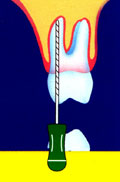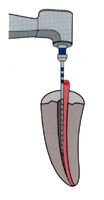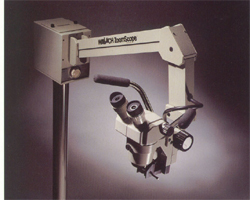|
Services
Dental
implants
Bone grafting
procedures
Soft tissue
plastic
Restorative
dentistry
Periodontology
Endodontic
treatment
Teeth
restoration
Oral hygiene |
Endodontic treatment
Inside each tooth is the pulp which provides nutrients and nerves to
the tooth, it runs like a thread down through the root. When the
pulp is diseased or injured, the pulp tissue dies. There are
numerous reasons why teeth need root canal treatment but the two
most common causes are:
Physical irritation of the nerve or pulp. Deep decay present in a
tooth can physically irritate the nerve.
Also, large or deep fillings that are close to the nerve can also
cause nerve irritation. These fillings may have been placed a few
days prior to the onset of symptoms. Conversely, the fillings may
have been placed years prior to any symptoms of nerve irritation.
 Trauma
in the form of a physical blow to a tooth can cause nerve
irritation. The trauma may have been recent or many years in the
past. Also, trauma resulting in physical fracture of the tooth close
to or near the nerve results in nerve damage. Trauma
in the form of a physical blow to a tooth can cause nerve
irritation. The trauma may have been recent or many years in the
past. Also, trauma resulting in physical fracture of the tooth close
to or near the nerve results in nerve damage.
If you don't remove the damaged nerve, your tooth gets infected and
you can lose it. Some time ago, if you had a tooth with a diseased
nerve, you'd probably lose that tooth. Today, with a special dental
procedure called a root canal therapy you may save that tooth.
Once it has been determined (with X-Rays and clinical examination)
that root canal treatment is necessary, it will take one or more
appointments to complete the therapy. It is very important that
patients keep these appointments for treatments to be smooth and
successful. Antibiotics and pain medication may be prescribed and it
is essential that these medications be taken as directed.
  After
getting the tooth numb with strong anesthetic solutions and
isolating the tooth with a rubber dam, an opening is made through
the top portion of the tooth into the pulp. The pulp is then
carefully removed and the root canal area inside your mouth is
cleaned, enlarged, shaped and sterilized. After
getting the tooth numb with strong anesthetic solutions and
isolating the tooth with a rubber dam, an opening is made through
the top portion of the tooth into the pulp. The pulp is then
carefully removed and the root canal area inside your mouth is
cleaned, enlarged, shaped and sterilized.
In some cases, the root canal therapy may be completed in this one
appointment by permanently filling and sealing the root canal area.
In other cases, a temporary medication and filling is placed in the
tooth at this time. Sometimes, if a tooth is badly infected, the
tooth may be left open which allows the infection to drain.
At the subsequent visit, the root canal is finished by permanently
filling and sealing the root canal area inside the tooth. X-Rays are
taken at various points during the procedure to ensure that all of
the infected pulp is removed and that the whole canal is sealed upon
completion of treatment. After the root canal treatment is
completed, a permanent filling or restoration will need to be placed
into the opening that was made in the tooth.
Dental microscope.

 |


 After
getting the tooth numb with strong anesthetic solutions and
isolating the tooth with a rubber dam, an opening is made through
the top portion of the tooth into the pulp. The pulp is then
carefully removed and the root canal area inside your mouth is
cleaned, enlarged, shaped and sterilized.
After
getting the tooth numb with strong anesthetic solutions and
isolating the tooth with a rubber dam, an opening is made through
the top portion of the tooth into the pulp. The pulp is then
carefully removed and the root canal area inside your mouth is
cleaned, enlarged, shaped and sterilized.